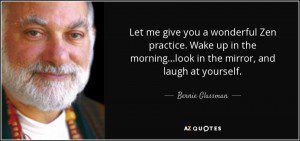I notice I usually write appreciations of people after they’re dead. I thought, well, for once, perhaps an appreciation of someone while they might get a chance to see it would be in order. So, here you go…
Bernard Glassman was born in Brighton Beach, in Brooklyn New York on this day in 1939, the fifth child and only boy in the family. His parents were both Jewish immigrants, his mother was Polish, who had lost much of her family to the Holocaust, his father was from Russia. While Bernie’s parents were not particularly political, his father’s sisters were all communists, and so he was, one might say, a red diaper baby, perhaps once removed.
He discovered a talent for taking small appliances like radios apart and putting them back together. With the attendant miracle they usually worked after the reassembly. Bernie attended Brooklyn Polytechnic where his fascination with things and with mathematics was given full range. During these years he also read Huston Smith’s Religions of Man. The few pages on Zen caught his imagination. And before long he also found Philip Kapleau’s Three Pillars of Zen. And by the time he graduated he realized he had three goals. He wanted to live in a Zen monastery, and on a kibbutz in Israel, and, to live in the Bowery. Let’s say he would succeed.
Bernie went to Israel and the kibbutz first. While there he had a teaching assistantship at the Israel Technion. The kibbutz introduced Bernie to practices of silence and presence, something he had primarily read about up until then. He also met Helen Silerberg, who would become his first wife.
Then Bernie took a job with Douglas (now McDonnell Douglas) and moved back to the States and to Los Angeles. There he worked as an aeronautical engineer focused on the development of manuals for projected Mars flights. In support of this work he undertook doctoral studies at UCLA, earning his PhD in applied mathematics in 1970. During these years, and most important for Zen in the West, he also met Hakuyu Taizan Mazumi, who would become his primary teacher. Bernie threw himself into the practice. After a brief period of study in Japan he and Helen moved into the new Zen Center of Los Angeles. In 1976, roughly twenty years after beginning study with Maezumi Roshi, Bernie received full Dharma transmission.
A few years later he returned to the East coast to establish the Zen Community of New York. There Bernie found his teaching style moving away from the traditional forms of the Soto school (traditional Soto enriched by the koan curriculum he had inherited from Maezumi Roshi). His interests in practical ways to engage the social problems of our times began to be a major part of his focus leading to the formation of the Greystone Foundation. Probably the most notable project to arise in those years was Greystone Bakery, which employed and trained people in the neighborhood.
In 1994 this led to the establishment with his then wife, the late Sandra Jishu Holmes of the Zen Peacemaker Order. Several of the more significant contemporary Western Zen teachers were involved in this new project, including Joan Jiko Halifax, Eve Myonen Marko, Wendy Egyoku Nakao, Grover Genro Gauntt, and Pat Enkyo O’Hara.
During his kaleidoscopic career, exploring the best ways to teach the Zen dharma, manifest it in his own life, and be of use in the larger world, Bernie would eventually disrobe as a priest, although continue to teach, explore a variety of training modalities including “street retreats,” and reach to find ways to integrate social entrepreneurial enterprises with the disciplines of Zen. Oh, and he became a clown.
Bernie would make mistakes. He did some incredibly wise things, and a couple of monumentally stupid ones. He hobnobbed with the rich and famous and gave his heart to the forgotten and dispossessed.
And, on balance, Bernie Glassman become possibly the most significant Zen teacher bridging between the missionaries and Western born teachers who did the vast bulk of their training in East Asia and our contemporary generation of fully Western trained teachers. It is impossible to calculate his importance.
In January of 2016 Bernie suffered a stroke. But, it seems only to have slowed him down a little. Bernie and his wife the Zen teacher Eve Marko continue to be active with the ZPO.
May they continue for many years to come.
And, happy birthday, Roshi!













